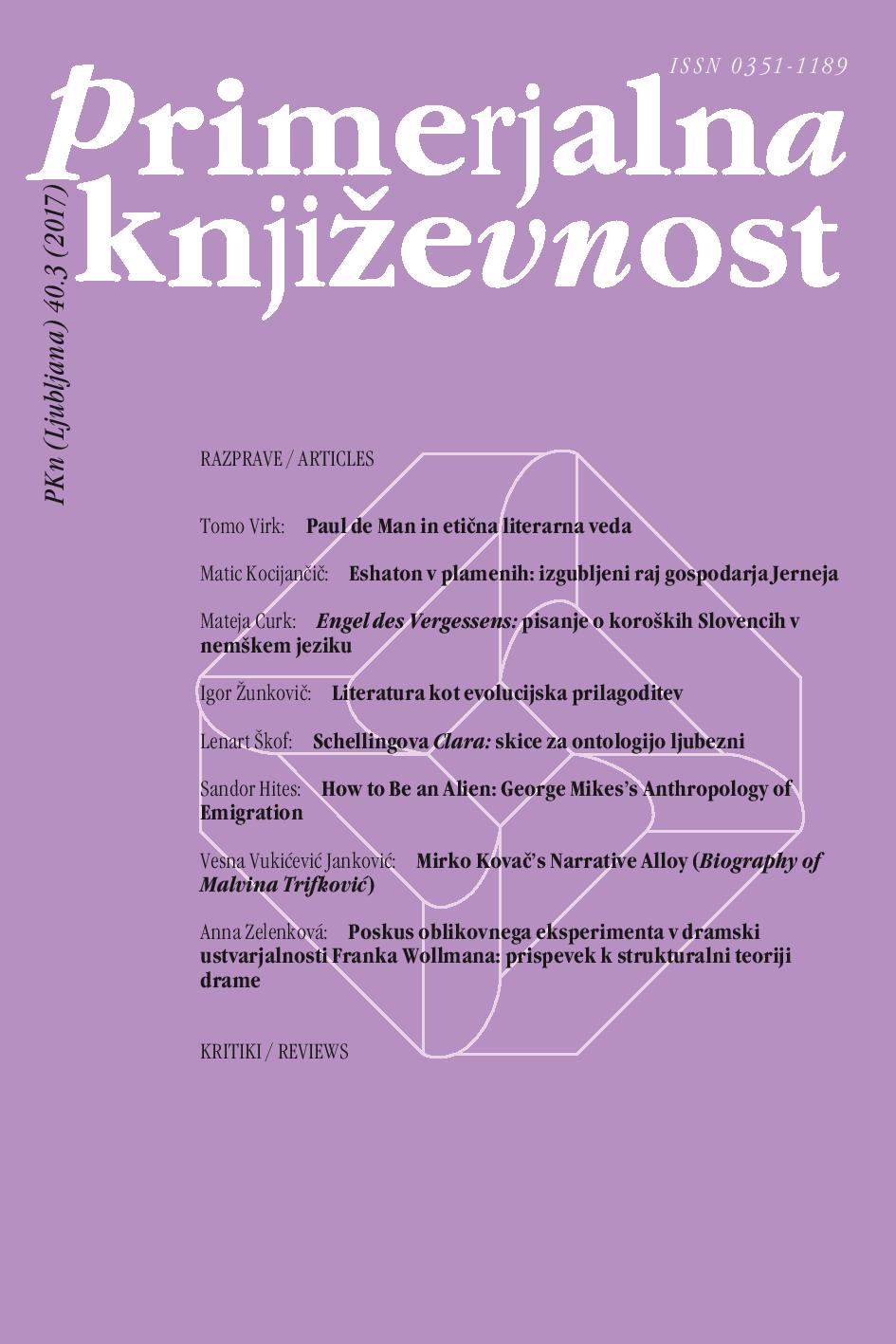How to Be an Alien: George Mikes’s Anthropology of Emigration
Keywords:
English literature, satire, intellectuals, emigration, Eastern Europe, Hungary, Mikes, George, How to Be an Alien, national stereotypes, strangenessAbstract
The paper examines the best-selling satirical book How to Be an Alien (1946) by the Hungarian émigré journalist and prominent British humorist George Mikes (1912–1987). I argue that tackling the issues of emigration, integration and belonging, Mikes employs a mock-anthropological approach: ironically reworking the notions of observation and imitation as survival strategies, HTBA grasps the absurdities underlying both British life and the newcomer’s struggle to blend in. The two sequels Mikes wrote to HTBA decades later demonstrate that once the “alien” has been successfully integrated, the sense of acquired Britishness only produces further absurdities. Examining HTBA and a selection of his other works, I also claim that Mikes’s satire is an unacknowledged contribution to the modern philosophical tradition of “strangeness” (exemplified by authors ranging from G. Simmel to H. Arendt, Th. Adorno and Z. Bauman). Today, Mikes’s legacy continues to inspire expatriates living in London and elsewhere. However, his emblematic work has also inspired a stream of books with diametrically opposite intentions: these encourage their native readers to regain their allegedly fading socio-cultural heritage. In the transformation of Mikes’s satire about aliens adapting to new environments into an encouragement of natives to embrace their own, one can witness both the disintegration of traditional cultural belonging and a new appeal of indigeneity.References
Adorno, Theodore. “Refuge for the Homeless” [1944]. Minima Moralia. Reflections on a Damaged Life. Trans. E. F. N. Jephcott. London: Verso, 2005. 38–39.
Arendt, Hannah. “The Jew as a Pariah: A Hidden Tradition.” Jewish Social Studies 6.2 (1944): 99–122.
Clifford, James. “Introduction: Partial Truths.” Writing Culture: The Poetics and Politics of Ethnography. Ed. James Clifford, George E. Marcus. Berkeley: University of California Press, 1986.
– – –. Returns. Becoming Indigenous in the Twenty-First Century. Cambridge (MA): Harvard University Press, 2013.
Congdon, Lee. Exile and Social Thought: Hungarian Intellectuals in Germany and Austria, 1919–1933. Princeton: Princeton University Press, 1991.
Crick, Malcolm. “Representations of International Tourism in the Social Sciences: Sun, Sex, Sights, Savings and Servility.” Annual Review of Anthropology 18 (1989): 307–44.
Culler, Jonathan. “The Semiotic of Tourism.” Framing the Sign: Criticism and Its Institutions. Norman: University of Oklahoma Press, 1989.
Deciu Ritivoi, Andreea. Intimate Strangers: Arendt, Marcuse, Solzhenitsyn, and Said in American Political Discourse. New York: Columbia University Press. 2014.
Fletcher, Adam. How to Be German. In 50 Easy Steps. Munich: C. H. Beck, 2013.
Fox, Kate. Watching the English: The Hidden Rules of English Behaviour. London: Hodder, 2004.
Friedlander, Albert H. “George Mikes.” Routledge Encyclopedia of Jewish Writers of the Twentieth Century. Ed. Sorrel Kerbel. New York: Fitzroy Dearborn, 2003.
Hites, Sándor. “To Be Born into Exile. Kelemen Mikes and the 19th-20th Century Hungarian Literary Exiles.” Transmission of Literature and Intercultural Discourse in Exile. Ed. Gábor Tüskés, Bernard Adams, Thierry Fouilleul, Klaus Haberkamm. Bern: Peter Lang, 2012. 445–457.
Holmes, Colin. “British Government Policy Towards Wartime Refugees.” Europe in Exile: European Exile Communities in Britain, 1940–1945. Ed. Martin Conway, Jos Gotovich. New York: Berghahn, 2001.
Kabdebo, Thomas. “George Mikes.” Encyclopedia of British Humorists. Volume 2. Ed. Stephen H. Gale. New York: Garland, 1996. 763.
Leerssen, Joep. National Thought in Europe: A Cultural History. Amsterdam: Amsterdam University Press, 2006.
Malinowski, Bronisław. Argonauts of the Western Pacific [1922]. London: Routledge, 2002.
Mikes, George. The Land of the Rising Yen. London: Deutsch, 1970.
– – –. Any Souvenirs? Central Europe Revisited. London: Deutsch, 1971.
– – –. How to Be Seventy. An Autobiography. London: Deutsch, 1982.
– – –. How to Be a Brit. (How to Be an Alien: A Handbook for Beginners and Advanced Pupils [1946]; How to Be Inimitable: Coming of Age in England [1960]; How to Be Decadent [1977]). London: Penguin Books, 1986.
Neubauer, John. “Exile: Home of the Twentieth Century.” The Exile and Return of Writers from East-Central Europe. Ed. John Neubauer, Borbála Zsuzsanna Török. Berlin: De Gruyter, 2009. 4–103.
Pratt, Mary Louise. “Fieldwork in Common Places.” Writing Culture: The Poetics and Politics of Ethnography. Ed. James Clifford, George E. Marcus. Cambridge (MA): University of California Press, 1986. 27–50.
Rapport, Nigel. “‘Best of British!’ An Introduction to the Anthropology of Britain.” British Subjects. An Anthropology of Britain. Ed. Nigel Rapport. Oxford: Berg, 2002. 3–23.
Rubiés, Joan Pau. “Travel Writing and Ethnography.” The Cambridge Companion to Travel Writing. Ed. Peter Hulme, Tim Youngs. Cambridge: Cambridge University Press, 2002. 242–260.
Scheding, Florian. “‘I Only Need the Good Old Budapest’: Hungarian Cabaret in Wartime London.” Twentieth-Century Music and Politics: Essays in Memory of Neil Edmunds. Ed. Pauline Fairclough. London: Routledge, 2013. 211–230.
Simmel, Georg. “The Stranger.” The Sociology of Georg Simmel. Trans. Kurt H. Wolff. Glencoe: The Free Press, 1950. 402–408.
Szirtes, George. A Mini-Essay on George Mikes. http://georgeszirtes.blogspot.hu/2009/09/mini-essay-on-george-mikes-part-1_22.html.
Tabori, Paul. The Anatomy of Exile. London: Harrap, 1972.
Timms, Edward, Hughes, Jon (ed.). Intellectual Migration and Cultural Transformation: Refugees from National Socialism in the English-Speaking World. Vienna: Springer, 2003.


